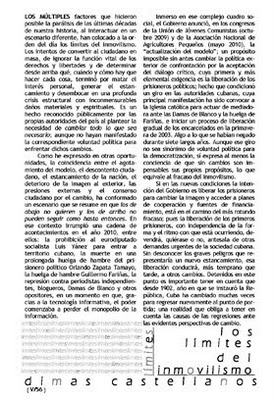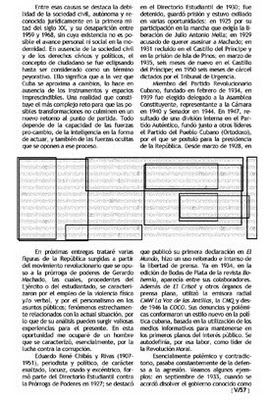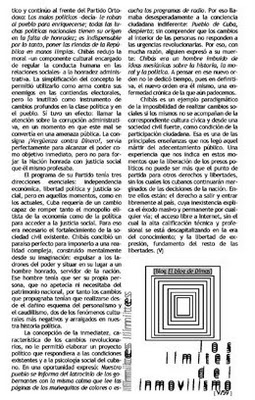



The Limits of Immobility
By Dimas Castellanos
The multiple factors that made possible the paralysis of our history in recent decades, while interacting on a different stage, have placed the limits of immobility on the daily agenda. The attempts to convert citizens by the masses, to ignore the vital function of rights and liberties, and to determine from above when and how every single thing needs to be done, ultimately killed personal interest, generated stagnation and lead to a profound structural crisis with immeasurable material and spiritual damages. It is a publicly recognized fact, by way of the country’s authorities themselves posing the need to cambiar todo lo que sea necesario (change everything necessary); even though they did not manifest the corresponding political will to face said changes.
Like I have expressed during other opportunities, the coincidence between the exhaustion of the model, the unhappy citizen, the stagnation of the nation, the deterioration of the exterior image, external pressures and the citizen’ consensus for change, has shaped a scene that summarizes that los de abajo no quieren y los de arriba no pueden seguir como hasta entonces(those below don’t want to and those above can’t until then). In that context, it interrupted a chain of events in the year 2010, among them: the prohibition of entry into Cuban territory of the Socialist MEP (Member of the European Parliament), Luis Yánez, the death of political prisoner Orlando Zapata Tamayo during a prolonged hunger strike, Guillermo Fariñas’ hunger strike, the repression against independent journalists, bloggers, Damas de Blanco and other opponents, during a time in which, thanks to information technology, power began to loose its monopoly over information.
Immersed in the complex social framework, the Government announced in the congresses of the Unión de Jóvenes Comunistas or Communist Youth Union (October 2009) and the Asociación Nacional de Agricultores Pequeños or National Association of Small Farmers (May 2010), the “actualización del modelo” (updated model), an impossible proposition without first replacing the foreign policy of confrontation with the acceptance of critical dialogue, whose first and most basic requirement is the release of political prisoners, a fact which created a shift in the Cuban authorities, whose main event was to call on the Catholic Church to mediate before the Damas de Blanco and Fariñas’ strike, and initiate a process of gradual release of those incarcerated in the spring of 2003. Something to which they had refused for seven long years. Although that shift is not synonymous with the political will for democratization, it expresses at least an awareness that without changes their own proposals are unthinkable, equivalent to the failure of immobility.
If in the new conditions, the intention of the Government is to liberate prisoners to change the image and accept plans for cooperation and sources of funding, it is on the path to flat-out failure; since the release of the first prisoners, regardless of the form or pace at which it is occurring, will become, like it or not, a prelude to other urgent demands from Cuban society. Not ignoring the grave dangers that new stagnancy would represent, the liberalizations will lead, sooner than later, to other changes. Stopping on this point, it is important to note that since 1902, when it the Republic was established, Cuba has changed many times only to return to the starting point again, a reality that forces one to take into account the causes of the regressions when faced with evident prospects for change.
Among them, these cases highlight the weakness of civil society, independent and legally recognized in the first half of the twentieth century, and then its disappearance between 1959 and 1968, without whose existence it’s not possible to advance personally or socially toward modernity. In the absence of civil society and civil and political rights, the concept of the citizen was eclipsed until it came to be considered a pejorative term. This means that at the time that Cuba is approaching changes, it lacks the essential tools and spaces to realize them. A reality that constitutes the most complex challenge for the many transformations that don’t leave to a return to the point of departure. Everything depends on the capacity of the pro-change forces, of intelligence in the form of action, and also of the hidden forces that oppose this process.
In the next installment I will discuss various figures of the Republic emerging from the revolutionary movement who opposed the extension of Gerardo Machado’s powers, who, from the Army or the student population, were characterized by the use of physical and/or verbal violence, and by personalizing public affairs; these are phenomena closely related to the current situation, so this analysis may give rise to valuable lessons for the present. In this article I will concern myself with a man who was essentially characterized by the fight against corruption.
Rene Eduardo Chibas y Rivas (1907-1951), journalist and politician, exalted character, talkative, bold and eccentric, joined the Student Directorate Against the Extension of Powers in 1927. He was highlighted in the Student Directory of 1930, was arrested, imprisoned and exiled on several occasions: in 1925 for his participation in the rally demanding the release of Julio Antonio Mella; in 1929 accused of wanting to kill Machado; in 1931 imprisoned in the Castle of Prince and the Island Prison Pinos; in March 1935, he spent six months back in the Castillo del Principe; and in 1950 her served six months in prison handed down by the Emergency Court.
A member of the Cuban Revolutionary Party, founded in February 1934, in 1939 he was elected delegate to the Constituent Assembly, and sat in the House in 1940 and in the Senate in 1944. In 1947, the result of an internal split in the Authentic Party, founded together with other leaders of the Party of the Cuban People (Orthodox), he ran for the presidency of the republic. From March 1928, he published his first statement in El Mundo, and he made intense and repeated use of the freedom of the press. As early as 1934, the Silver Anniversary edition of the magazine Bohemia, he appeared among its collaborators. In addition to The Crucible and other media of the printed press, he used the radio station CMW Voice of the West Indies, the CMQ, and from 1946 the COCO. His denunciations and controversy formed a new style in Cuban politics, based on the use of the media to stay in the limelight of public interest. He defined himself, in this work, as leader of the Moral Revolution.
He was essentially controversial and contradictory, constantly going from defense to aggression. Some examples: In September 1933, when it was agreed to dissolve the government known as the Pentarchy, he proposed Grau San Martín for president; then, in January 1946, praised the work of President Grau with the following words: In the educational order, we have cash, for the first time in the history of Cuba, which was a dream of Martí and a desire Estrada Palma: that the republic would have more teachers than soldiers. However, in June 1948 he accused Grau of: emulating the Borgia, the greatest pretender that has been given to the world since the time of Caligula, at whose side I have sacrificed twenty years of my life, without asking or accepting anything.
Consummate anti-communist, he presented at the Constitutional Convention a motion of solidarity with Finland on its invasion by the Soviet Army and among other things said: Stalin has betrayed the teachings of Lenin by transforming himself into an imperialist despot in the style of Ivan the Terrible. And in July 1940, during the signing ceremony of the Constitution, he denounced “that it already is being violated in spirit in favor of some who signed it.”
He employed the accusations, mainly corruption, in a systematically way. In May 1939 he accused Blas Roca of treason; in 1942 the chief of police of overstepping his boundaries; in 1943 he filed two motions in the House against Batista and against Congress; in July 1945 he accused Carlos Miguel de Céspedes of the sale of a piece of Paseo; and in January 1947, in a letter read on the radio, he challenged Grau for alleging intending to be reelected; in 1950 he accused President Prio of the assault on a correctional court, and stealing the documents of a charge of embezzling hundreds of thousands of pesos; in 1951 he accused Rolando Masferrer of a placing a bomb in the house of Roberto Agramonte, and so on.
His behavior earned him friends and enemies. Considered crazy, he replied: I’d rather be a mad person with shame than a shameless thief. When Carlos Prio won the 1948 election, he said: Chibas has been a fraud all his life. Not exactly crazy, but abnormal. Chibas doesn’t know where his heart is and is not aware of the existence of truth. With others, Chibas dueled with swords, guns and fists. The defense of what he considered useful at any time led him to make critical assessments.
In February 1946, he established a distinction between a revolutionary attack and simple terrorism. He said: The use of the bomb can be explained when it is used as a crack of rebellion against a regime of terror … but never when used against a government which is the product of national will.
Death was in his work and in his speech. In November 1939, on the eve of the election of delegates to the Constituent Assembly, he was wounded and when asked who had been the aggressors, he said: Do not worry about finding out, I die for the revolution, vote for Grau San Martín; but the popularity from having been shot gave him second in the voting.
In January 1948, at a meeting of the party, he jumped on the head table and began to shout, Throw out your heart! Orthodoxy needs a martyr! In May of that year, during a campaign tour in the East, he said: The day that Chibas is thinking about warning of an extinction or a decline in the civil love, part of a shot to the heart, not for cowardice before the failure, his sacrifice will lead to the victory of his disciples. In 1951, unable to prove the charge against Aureliano Sánchez Arango, he shot himself on August 5, from which he died on the 16th of same month.
In The Crucible of August 7, 1944, setting forth the reasons for authenticism, he said that it only needed a group of Cubans ashamed of the government of the State to break the circle that is suffocating the Republic, and condemning us to the status of outcasts in our own land. Then, to create the Orthodox Party, which was considered the only political force that provides the people of Cuba a new perspective, one that opens new avenues into the country. As a result of his work and his style, in a survey conducted in June 1950, Chibas was the strongest candidate for the presidency, which was confirmed with another held on May 20, 1951, which gave him 29.70% of the vote against 19.03% for Fulgencio Batista.
The idea of administrative honesty was the essence of the political movement that started from the Authentic Party and continued from the initiation of the Orthodox Party: The bad politicians, he said, steal from the rich people, all domestic political struggles are rooted in lack of honesty, it is essential therefore to put the reins of the Republic in clean hands. Chibas reduced the moral — a cultural component responsible for regulating human behavior in social relationships — to administrative honesty. The simplification of the concept allowed him to use it as a weapon against his enemies in elections, but it was unusable as an instrument of profound changes in the political class and the people. It had a purpose: to draw attention to administrative corruption at a time when the disease was becoming a public menace. The slogan Shame against Money!, served perfectly to achieve power as an immediate objective, but not to build the nation honored with social justice that he himself professed.
The program of his party had three main directions: economic independence, political freedom and social justice, but in those times, as in the present, Cuba needed a change capable of breaking both the elitist monopoly of the economy as a policy to access social justice. Because it was necessary to strengthen existing civil society. Chiba devised a perfect paradise to be imposed on a complex reality, mentally constructed from his imagination: expel the thieves of power and put in place an honest man, servant of the nation. That man had to be his own person, who did not desire nor need the national patrimony, and thus the changes advocated had to be realized from the damaging pattern of focusing on personality and warlordism, two of the negative cultural phenomena rooted in our political history.
The concept of immediacy, characteristic of the revolutionary changes, did not allow the drafting of a policy to respond to the existing conditions and social psychology of Cuba. On one occasion he said: Our people are reporting the theft of the rulers with the same calmness that they read the pages of color comics or listen to radio programs. So he called desperately to the public conscience of the indifferent Cuban citizens: People of Cuba, wake up, not realizing that the changes within people do not respond to revolutionary emergencies. So, quite rightly, someone said at his death: Chibas was a man imbued with messianic ideas about history, morality and politics. He dedicated no time to thinking of the new order, because ultimately, the new order was himself, a chronic disease that we still suffer from.
Chibas is a paradigmatic example of the impossibility of social change if it is not accompanied by a corresponding civic culture and arises from a strong civil society, as a condition of participation. That’s one of the main lessons that comes to us from this martyr to cleaning up society. An experience that tells us now that the release of political prisoners can not be more than the starting point for other rights and freedoms, without which Cubans remain marginalized in the decisions of the nation. These include: the right to freely leave and enter the country, whose absence explains the continuing mass exodus by any means; free Internet access, without which superior technical and professional qualifications are devalued in the knowledge era; and freedom of expression, the foundation of all other freedoms.
Translated by: Antonio Trujillo
August 16, 2010




 “That was before,” answered the girl who was ahead of me, when I mentioned the old slogan. “Now it’s more like Save Yourself If You Can.” Though still very young, she spoke as if we had known each other our entire lives. Looking through the windows of the store, awaiting the doorman to authorize our entry with the well known little phrase que pasen tres (three may pass), we kept busy watching the cashier struggle, due to the exaggerated length of her fake fingernails, as she input codes and prices. My attention was drawn to the ring she exhibited on her ring finger. It was round, flat and huge; just like a bull-fighting arena. This, together with the noise caused by her plastic fingernails as they crashed against the calculator, made me think that she too was haciendo el papeleo (processing her paperwork) to become a cubañola (a Spanish citizen who would still pass as Cuban) and was simply, already trying to fit into her environment. Well, it sounded almost like castanets playing.
“That was before,” answered the girl who was ahead of me, when I mentioned the old slogan. “Now it’s more like Save Yourself If You Can.” Though still very young, she spoke as if we had known each other our entire lives. Looking through the windows of the store, awaiting the doorman to authorize our entry with the well known little phrase que pasen tres (three may pass), we kept busy watching the cashier struggle, due to the exaggerated length of her fake fingernails, as she input codes and prices. My attention was drawn to the ring she exhibited on her ring finger. It was round, flat and huge; just like a bull-fighting arena. This, together with the noise caused by her plastic fingernails as they crashed against the calculator, made me think that she too was haciendo el papeleo (processing her paperwork) to become a cubañola (a Spanish citizen who would still pass as Cuban) and was simply, already trying to fit into her environment. Well, it sounded almost like castanets playing.